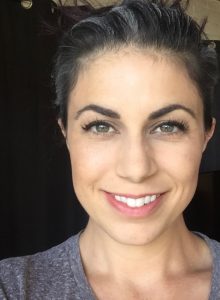Elizabeth Davis, Ph.D. our Spotlight Scientist, talks about developmental psychology research and the importance of using videos in undergraduate education, psychology research, and tackling the reproducibility crisis.
Elizabeth Davis, Ph.D. is Assistant Professor in the Department of Psychology at UC Riverside. She recently published a JoVE Video Article highlighting methodology to assess the effectiveness with which children regulate emotion.
Q. Could you tell us about your overall research focus?

A. My research focuses on the development of emotion regulation in childhood. I am interested in finding out how children manage their negative emotions or stress. Do parents teach them? Do they learn from interactions with other kids? Do they just kind of figure it out as they go?
Kids don’t necessarily have access to all the same emotion regulation strategies that adults or teenagers do, so they’re a little bit limited in what kind of things they’re able to do at different developmental stages.
The ultimate goal for us is to identify certain strategies that would be helpful for kids to use in different contexts (in school, on a playground or with their parents), and be able to teach kids these strategies if they don’t know them.
Q. Who do you think might benefit from your recent JoVE publication?
A. A unique aspect of our video is that we are able to show a paradigm – where we are instructing kids to use different emotion regulation strategies (while they are in the lab) and then measuring behavioral outcomes for that particular study.
I think our JoVE Video Article can help serve as a guidebook or manual for other developmental psychology researchers, who are asking similar questions and there’s always been a lot of interest in this protocol. Researchers were interested to know how we make sure that kids understand what they’re supposed to do and how we provide the different instructions to them for various emotion regulation strategies.

Q. Do you use JoVE videos in teaching or training students at UC Riverside?

A. Yes, I have used this Video Article in the classroom already. While teaching advanced undergraduate students, I have found several other JoVE videos beneficial to show different developmental psychology protocols.
Often reading a method from a traditional journal does not resonate with undergraduates. It’s nice to have this visual walkthrough of what the researchers mean when they say, “Here’s what we did next,” and also for these students to see it demonstrated with an actual child, so they do not have to imagine it.
Q. Do you think visual science specifically can help the field of psychology research?
A. I think it’s a tremendous asset, especially for psychology. Visualizing the exact parameters for the setup for anything that’s involving human behavior is incredibly valuable. Even if it seems like it’s something that you could describe thoroughly in a text, it’s always a different picture that you’re getting if you can see the video.
 Q. Can video demonstrations of experiments help address any overarching or existential problems in the field of behavioral research?
Q. Can video demonstrations of experiments help address any overarching or existential problems in the field of behavioral research?
A. Psychology, like every science, is dealing with the reproducibility crisis, and I think visualized experiments would come in very handy to address this problem. There’s been a big push in psychology to make research more transparent in general. Having very clear video footage of experiments from different labs will help to answer whether a researcher or a lab having difficulty replicating an established finding is correctly conducting the science. If we had archival video footage of all these classic experiments that don’t seem to be reproducing consistently, we would be able to track parameters down to the millimeter, and set up everything in the participant’s environment the same way or get much closer than we can now.
Q. Is there a message you would like to give out to aspiring researchers and faculty?
A. The advice I would give to people who are early in their training is to start cultivating an appreciation for critiques and feedback. Science is a self-correcting process and feedback is part of it. It will help strengthen your ability to articulate your ideas, come up with clever research designs, and carry out studies that can help address gaps in our current understanding of a particular phenomenon.



